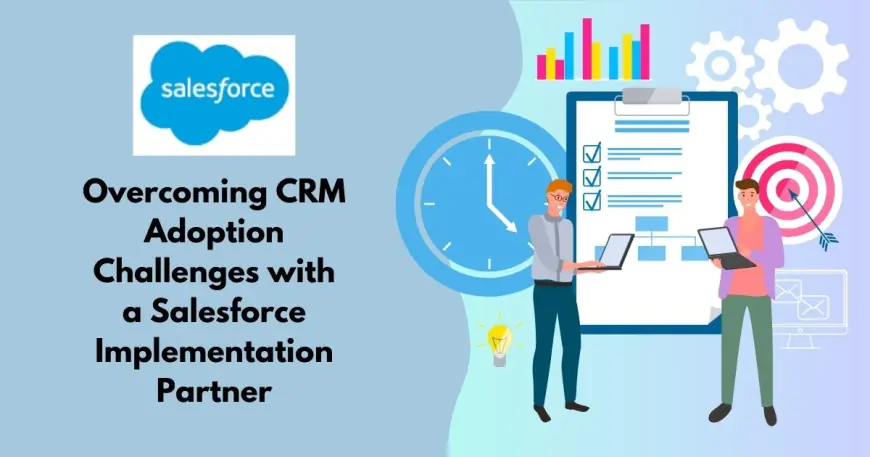Overcoming CRM Adoption Challenges with a Salesforce Implementation Partner
Implementation Partner plays a crucial role in guiding businesses through the intricacies of Salesforce adoption, these experts help mitigate challenges, ensuring a seamless transition and long-term success.

Customer Relationship Management (CRM) systems are essential for businesses looking to optimize customer interactions, improve efficiency, and drive sales. However, despite their potential benefits, CRM adoption remains a major challenge for many organizations. Employees may resist the change, data migration may be complex, and customization can be overwhelming. This is where a Salesforce Implementation Partner plays a crucial role. By guiding businesses through the intricacies of Salesforce adoption, these experts help mitigate challenges, ensuring a seamless transition and long-term success.
Understanding the Barriers to CRM Adoption
Before diving into how a Salesforce Implementation Partner can help, it is essential to understand the primary reasons businesses struggle with CRM adoption:
-
Resistance to Change
Employees often resist new technologies due to unfamiliarity, fear of increased workload, or concerns about job security. Without proper training and engagement, adoption rates suffer. -
Poor Data Management
Migrating existing data into Salesforce can be complicated, leading to inconsistencies, duplicates, or missing information. A poorly executed data transfer can result in inefficiencies rather than improvements. -
Lack of Customization and Integration
A one-size-fits-all CRM rarely works for every business. Without proper customization and integration with existing tools, Salesforce may feel like an additional burden rather than a solution. -
Inadequate Training and Support
Employees need proper training to leverage Salesforce’s full potential. Without continuous support, they may revert to old methods, reducing the effectiveness of the CRM system. -
Low User Engagement
If Salesforce is not user-friendly or aligned with business processes, employees may avoid using it, leading to low adoption rates and wasted investment.
The Role of a Salesforce Implementation Partner in Overcoming Adoption Challenges
A Salesforce Implementation Partner is more than just a consultant; they are an essential ally in ensuring a smooth CRM transition. Their expertise can directly address adoption challenges, making the process structured, efficient, and beneficial for all stakeholders.
1. Change Management and Employee Engagement
One of the most significant obstacles to CRM adoption is resistance to change. A Salesforce Implementation Partner helps overcome this by:
-
Creating a Change Management Strategy: By identifying key stakeholders and addressing concerns, partners ensure a smoother transition.
-
Involving Employees Early: Encouraging early involvement fosters a sense of ownership and reduces resistance.
-
Demonstrating Immediate Benefits: By showcasing how Salesforce can make employees' tasks easier rather than harder, partners increase willingness to adopt the system.
2. Data Migration and Accuracy
A poorly executed data migration can lead to inaccurate reporting, duplicate entries, and lost information. Salesforce Implementation Partners tackle this challenge through:
-
Data Cleansing and Standardization: Ensuring all data is accurate and formatted correctly before migration.
-
Structured Migration Plans: Using best practices, partners move data in phases to minimize disruptions.
-
Validation and Testing: Running test migrations to identify and fix potential issues before full deployment.
3. Customization and Integration
Many businesses struggle with CRM adoption because they try to use Salesforce in its default form, which may not align with their workflows. A Salesforce Implementation Partner helps by:
-
Customizing Salesforce to Business Needs: Tailoring fields, automation, dashboards, and workflows to ensure relevance.
-
Integrating Existing Tools: Connecting Salesforce with third-party applications (such as ERP, marketing automation, or customer support software) to maintain seamless operations.
-
Developing User-Friendly Interfaces: Making the platform intuitive so employees can navigate it effortlessly.
4. Comprehensive Training and Ongoing Support
Even a well-implemented CRM can fail if employees do not receive proper training. Implementation Partners ensure that users are well-equipped by:
-
Conducting Role-Specific Training: Tailoring sessions based on job functions to ensure relevant learning.
-
Providing Hands-On Experience: Using real-case scenarios to enhance understanding.
-
Offering Continuous Support: Setting up help desks, Q&A sessions, and refresher courses to address ongoing challenges.
5. Driving User Engagement and Long-Term Adoption
Merely implementing Salesforce is not enough; ensuring continuous engagement is crucial for maximizing ROI. Salesforce Services Provided by Implementation Partner enhances user adoption by:
-
Encouraging Best Practices: Helping teams streamline processes using Salesforce effectively.
-
Monitoring Adoption Metrics: Tracking login activity, data input quality, and system usage to identify areas for improvement.
-
Gamification and Incentives: Introducing reward-based systems to encourage active participation.
The Long-Term Impact of a Well-Executed Salesforce Implementation
With the right Salesforce Implementation Partner, businesses can experience long-term success, including:
-
Improved Productivity: Automating repetitive tasks allows employees to focus on high-value activities.
-
Better Customer Relationships: Access to accurate customer data enables personalized interactions and enhanced service.
-
Scalability and Flexibility: A well-integrated Salesforce system grows with the business, adapting to evolving needs.
-
Higher ROI on CRM Investment: With increased adoption and proper utilization, businesses can maximize their return on investment in Salesforce.
Final Thoughts
Overcoming CRM adoption challenges requires more than just software implementation—it requires a strategic approach tailored to business needs and user behavior. A Salesforce Implementation Partner plays an instrumental role in ensuring a smooth transition, from data migration and system customization to training and long-term engagement. By leveraging their expertise, businesses can transform Salesforce into a powerful asset that drives growth, efficiency, and customer satisfaction.
Rather than struggling with CRM adoption alone, businesses can rely on a trusted partner to turn Salesforce into an intuitive and indispensable tool for success. Investing in expert guidance not only enhances implementation but also ensures sustainable, long-term user engagement and business transformation.
Related Blog - Role of Salesforce Implementation Partners in Data Migration












